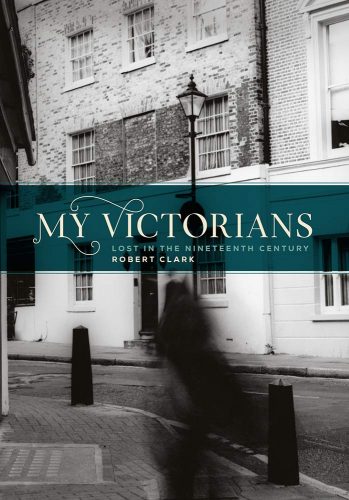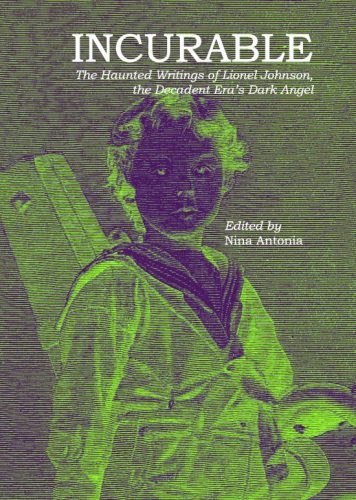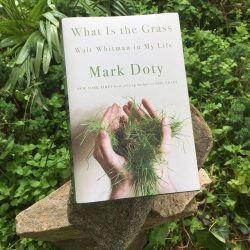Book Review: Long Live 19th-Century Literature!
By Tim Francis Barry
Like Nina Antonia and Robert Clark, Mark Doty deftly interweaves personal narrative with his literary concerns.
My Victorians: Lost In The Nineteenth Century by Robert Clark. University of Iowa Press, 184 pages.
Incurable: The Haunted Writings of Lionel Johnson, The Decadent Era’s Dark Angel. Ed. Nina Antonia. Strange Attractor Press/MIT Press, 216 pages.
What Is the Grass: Walt Whitman in My Life by Mark Doty. W.W. Norton, 288 pages.

Books borne of obsession inevitably hook me in. When a writer zeroes in on a topic with an unmistakably desperate passion for the subject — whether it’s New York City taxi drivers, the golden age of sportswriting, or peasant cuisine of the Dordogne — I’m in. And if the subject happens to dovetail with a particular interest of mine, I’m afraid I’m in for a long night.
In literary terms, England’s “long 19th century” runs roughly from the death of Jane Austen in 1817 to the publication of A Passage To India and Mrs. Dalloway just after WWI. What modernist Boston poet Amy Lowell dismissed as “that long set of sentimental hypocrisies set in England” is in fact ripe for reexamination today — and many writers are on the case.
Shaking off the shackles of prudishness and conventionality was predictable — as was the welcome coming of abstraction in painting and absurdism in drama. But the elemental power of deftly plotted storytelling in the best 19th-century novels — narratives that are highly detailed and richly rendered — is a value that will (and should not) ever be forsaken.
For me, Victorian literature offers a kind of benign escapism, at once familiar yet arcane, as much time machine as reading experience. Life had its own set-in-stone challenges — different from ours, but not all that different. (It’s not Chaucer.) It’s not the slick escapism of the new Harry Dolan or Michael Connelly thriller — though they are not without their formulaic charms — but a charmed glimpse through a looking glass, inspiring a nostalgia for an age none of us ever knew. And make no mistake, the twin totems of 19th-century writing — desire and aspiration, often at loggerheads — are still fresh.
Recently, I discovered I’m not a group of one. Robert Clark’s My Victorians is one of those books I’d wish I’d written. Inheriting an annual six-figure sum, he awards himself a sort of literary fellowship; decamping to London, he indulges in (unsuccessful) online dating while he traces the literary haunts and remains of his favorite olden days writers. A worthy pursuit.
Imagine how astonished and delighted I was when I discovered that George Gissing was one of his quarry. Gissing is pretty well forgotten aside from academia’s admiration for his novel about struggling writers, New Grub Street (1891). I’ve been reading Gissing for the past decade; I have made eyes glaze over with my repeated instance that Eve’s Ransom or The Odd Women be read. And I’ve seen people stifle a yawn when I tell them how Gissing’s life would make a great movie. (Local note: in his 20s he fled England for Massachusetts in a cloud of scandal. He ended up teaching at Waltham High School; after a few months he was chased out of town for an alleged dalliance with a female student.)
Then to make matters even better, My Victorians devotes a lengthy section to Arnold Bennett’s Riceyman Steps which, though published in 1923, is squarely sung in a anachronistic key. Clark argues that the novel serves as a bridge between 19th-century realism and the rise of modernism; I have no doubt he’s right. Bennett, he writes, committed the unforgivable sin of writing bestsellers. He attended teas and “at-homes’”at chez Woolf, and was then jeered about and mocked by the Bloomsbury crowd behind his back. (Nice folks.)
Say what you will about the author of To the Lighthouse and A Room Of One’s Own, (my copies have bookmarks on about page 32) I’ve found few books as appealing as Riceyman’s tale of a used bookstore owner and his daily travails (perhaps I’m biased, owning a used bookstore myself…).
Along the way, as Clark fails to get a second date with several London women, he brings to life a large chunk of late Victorian to early modernist British literature, through telling anecdote: Virginia Woolf’s father Leslie Stephen, educated her and her sister Vanessa at home, and Clark gives us the list of 15 books he assigned them to read, among them Oliver Cromwell’s Letters and Speeches. And he can’t resist pointing out that the great critic John Ruskin, author of the magisterial four-volume Modern Painters, among many other books, at the age of 39 fell in love with Rose La Touche, age nine.
Obsessions can be fatal in real life; in the case of books, they can be a source of delight and discovery. This is the payoff when reading Nina Antonia’s Incurable: The Haunted Writings of Lionel Johnson, the Decadent Era’s Dark Angel. Johnson’s close friend, the philosopher George Santayana, described him as “a spiritual rebel, a spiritual waif….in part like Shelley, in part like Rimbaud, he despised the world and adored the unreal.”
 A minor poet by anyone’s measure, Johnson was a central player in the circles of London’s late 19th-century avant-garde. His good pal “Willie” Yeats went on to great acclaim; his friend Oscar Wilde presented him with a signed advance copy of The Picture Of Dorian Gray. Antonia doesn’t try to make a case for pushing Johnson up into the canon. What she does do in her 50-page biographical introduction is deliver a bird’s-eye view of a very grimoire life.
A minor poet by anyone’s measure, Johnson was a central player in the circles of London’s late 19th-century avant-garde. His good pal “Willie” Yeats went on to great acclaim; his friend Oscar Wilde presented him with a signed advance copy of The Picture Of Dorian Gray. Antonia doesn’t try to make a case for pushing Johnson up into the canon. What she does do in her 50-page biographical introduction is deliver a bird’s-eye view of a very grimoire life.
Skulking about London’s half-lit, fog-choked alleys, Johnson knew the way to the next absinthe bar — he was ever in search of its “opalescent lure.” We visit salons, like the Cafe Royal, whence Johnson staggered out, drunk before lunch and, in an oft-quoted Wilde quip, “needed to hail the first passing perambulator (baby-carriage).” It was an especially cruel comment, given that Johnson was “never to grow beyond five foot three inches tall.”
No one would elevate Johnson’s writing to the level of Yeats, though, according to Antonia, he did exert “a great influence” on the poet. Judging from the generous selection of poems we’re given in Incurable, most come off as stale period pieces, though here and there a stanza sizzles with undeniable power. Impending doom seemed to most effectively tap into the lyricism in Johnson’s sensibility.
“Thou art the whisper in the gloom,
the hinting tone, the haunting laugh:
Thou art the adorer of my tomb,
The minstrel of mine epitaph.”
Antonia is the author of seven books, the first five of which catalogue the careers of “hopeless romantics,” such as punk rock icons Johnny Thunders and Peter Perrett of The Only Ones. Her 2005 biography of all but unknown glam-rock figure Brett Smiley, The Prettiest Star, is the closest in spirit to Incurable. Smiley, like Johnson, might have been a contender — if the chips had fallen a bit differently.
Antonia’s book The Prettiest Star points out what has become a major trend in nonfiction writing. In his book The Art of Biography, Paul Murray Kendall insists that “every biography is also an autobiography.” Antonia doubled down on that notion, interweaving her early life in Liverpool in the 1960s, interweaving her “unhappy girl from the North decides to go in search of her rock dreams” past with the “all but the brass ring” life of Smiley.
Mark Doty is a well-published (10 books) poet, though not “popular” in the mode of Billy Collins and Mary Oliver. The former Provincetown summer resident also has three memoirs under his belt, and this new book is part explication of Whitman — it hammers home the poet’s queerness — infused into a catchall volume that includes a free-ranging autobiography and speculative essay.
The great thing Doty accomplishes in What Is the Grass: Walt Whitman in My Life is that, while making a case for Whitman’s queer identity, he admits that “anyone sympathetic to such desires cannot miss Whitman’s intent.” In other words, read into Leaves Of Grass as much queerness as you choose. Queering writers of yesterday has become a cottage industry among contemporary critics: yes, Queequeg and Ishmael shared a bed in the Spouter Inn, “a queer sort of place.” But Melville’s protagonist chose to bunk in with the “clean, comely looking cannibal” because there weren’t enough beds available. That doesn’t mean he had the hots for him.
This is not to suggest that Doty is guilty of shoddy scholarship — in fact his methods and conclusions are compelling. But it leads one to wonder… if Lord Tennyson had been caught “cottaging” with a man in Leicester Square, would a critic now be allowed to point out the phallic imagery in “cannons to the right of them/cannons to the left of them?” And, more to the point, wouldn’t Tennyson be a hotter literary commodity?
 The truth is that there are no first person accounts of Whitman’s sex life. Doty recounts an afternoon meeting in 1882 between Walt and the 22 year old Oscar Wilde, but laments that what the “poet and his visitor actually said, of course, we know nothing.” And what did they do?
The truth is that there are no first person accounts of Whitman’s sex life. Doty recounts an afternoon meeting in 1882 between Walt and the 22 year old Oscar Wilde, but laments that what the “poet and his visitor actually said, of course, we know nothing.” And what did they do?
All the peering through the queering lens aside, Doty unpacks Whitman’s poetry in a valuable and accessible way, serving up generous excerpts from the poems. A professor of English, the poet has fun with some of his sources. He can barely contain his glee when quoting from the “reptilian” critic Rufus Griswold, who slammed Whitman in the late 1850s as a “sentimental donkey” who churned out “stupid filth.” “One would be hard-pressed to locate a copy of the collected works of Griswold,” Doty chuckles. (One of Griswold’s contemporaries, Edgar Allan Poe, slammed him as a hapless critic.)
Along the way, Doty provides a very user-friendly guide to poets and poetry of the 19th and 20th centuries: his study of Whitman morphs into a history of the development of poetical forms, from the the 19th century on. And for those of us who’ve never read Rilke or Hart Crane or Grace Paley, he gives us a stanza or two and just enough context to send us, now curious, looking for more. He name-checks a number of queer poets — James Schuyler, Tim Dlugos, and Eileen Myles — as stellar inhabitants all of Walt’s New York, but doesn’t provide the same guidance as he did with the earlier poet. Maybe modern poems are not meant to mean, but it would be interesting to have that argued.
Like Antonia and Clark, Doty deftly interweaves personal narrative with his literary concerns. In Provincetown’s leather bar The Vault, “certainly acts that were undeniably sexual did take place, despite the bar’s owner strolling through with a flashlight now and then and growling a little.” In his other memoirs, most memorably in Heaven’s Coast, Doty has done a fine job of sketching what life is like in Provincetown beyond the fried clam shacks and tourist-trap jewelry kiosks. One striking moment in What Is the Grass is when he remembers a particular sexual encounter; he looks up into the face of a bearded man in a New York bed and he sees Walt Whitman’s face! Lionel Johnson would understand.
Tim Francis Barry studied English literature at Framingham State College and art history at the University of Massachusetts-Dartmouth. He has written for Take-It Magazine, New Musical Express, Noise, and Boston Globe. He owns Tim’s Used Books, located in Provincetown and Northampton.


Terrific to have recommendations for George Gissing and Arnold Bennett, who was also an influential critic and playwright. I have been reading them on and off for years, with Gissing a particular favorite. Regarding neglected Bennett volumes, I would suggest 1913’s The Regent. I am a big fan of backstage yarns, and this is a very entertaining look at turn-of-century West End theater, at a time when drama and society was in transition. A wealthy provincial magnate builds a London theater and manages to make a go of it.
As for Gissing, I would highly suggest 1889’s The Nether World — a ferocious look at the poverty-stricken life led by the artisans, factory-girls, and slum-dwellers of Clerkenwell in the 1870s. It is an anti-Dickensian look at the bottom of society — no sentimentality, no romance, no happy ending, no relief. As Stephen Gill writes in his introduction to the Oxford Classic edition: “Little Dorrit or The Way We Live Now, for example, deploy the idea of money more variously and imaginatively, but none conveys the reality more starkly than The Nether World.”
The novel’s depiction of survival on the bottom rung is still a punch to the gut — it is an artistic success but, as Gill points out, readers will be viscerally discomforted because “the deserving are damaged, irreparably” and the undeserving are rewarded. As we move toward what may well be a Depression, this book becomes even more necessary.
In 1880 Gissing dedicated his art
The Nether World‘s vision of economic despair serves this purpose marvelously; it is one of the great novels about the lower depths.
You say that “Gissing is pretty well forgotten aside from academia’s admiration for his novel about struggling writers, New Grub Street (1891).” I would hardly think so. Gissing has more readers now than he ever had before. There has been a quarterly Gissing journal since 1965 of which I have been the editor these past four years subscribed to academics and many enthusiasts. Penguin, OUP, Broadview Press, Victorian Secrets, and Grayswood Press all have editions of his works in print at present some of which have not been out of print these past fifty years. There are also two Gissing websites devoted to him and a bookshop in Bradford that specialises in selling his works. Books about him, new translations of his novels, and new editions of his works are appearing every year.
I happily stand corrected. May Gissing continue to thrive!